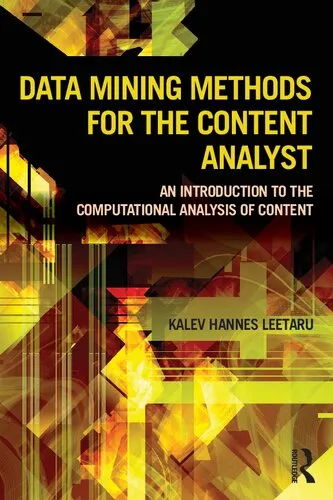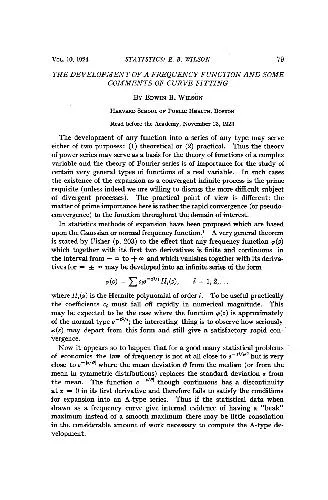Data Mining Methods for the Content Analyst: An Introduction to the Computational Analysis of Content
4.0
Reviews from our users

You Can Ask your questions from this book's AI after Login
Each download or ask from book AI costs 2 points. To earn more free points, please visit the Points Guide Page and complete some valuable actions.Related Refrences:
Introduction to "Data Mining Methods for the Content Analyst: An Introduction to the Computational Analysis of Content"
In today’s digitally interconnected world, vast streams of content are continuously being generated across multiple platforms—from social media posts and news articles to academic research and customer feedback. Analyzing these immense datasets has become essential for gaining insights into human thought, behavior, and trends. "Data Mining Methods for the Content Analyst" aims to introduce readers to the fundamentals of computational content analysis by leveraging advanced data mining techniques. This comprehensive book provides an approachable entry point for those who wish to harness the power of algorithms and automation to understand large-scale textual and multimedia datasets.
Written by Kalev Leetaru, a pioneer in computational analysis and data-driven research, this book bridges the gap between traditional qualitative research and quantitative computational methods. With a clear focus on practical applications, the book equips content analysts, social scientists, and data enthusiasts with the necessary tools and methodologies to explore the ever-evolving world of content mining.
Detailed Summary of the Book
"Data Mining Methods for the Content Analyst" is divided into accessible chapters that systematically unravel the complexities of computational content analysis. It begins by introducing the conceptual basics of content mining and how this field has evolved over time. The book discusses the shift from manual coding processes to fully automated systems that can analyze terabytes of text, video, and audio data within hours. Each chapter builds on this foundation, covering topics such as:
- Basic principles of data mining and content analysis.
- How to collect, preprocess, and clean large datasets to make them suitable for analysis.
- Key approaches such as keyword analysis, natural language processing (NLP), sentiment analysis, and social network analysis.
- Applications of machine learning, sentiment recognition, and predictive modeling in content mining.
- Real-world case studies that illustrate how data mining can solve societal, organizational, and individual challenges.
Throughout the book, practical examples and annotated Python code are provided, making it a valuable resource for technical learners. At the same time, the author explains concepts in a manner that is accessible to non-coders, ensuring that everyone can extract value from this resource.
Key Takeaways
This book is packed with actionable insights and provides the following key takeaways for readers:
- Understanding the foundations of data mining and how different methods fit into the broader discipline of content analysis.
- How to bridge the gap between qualitative and quantitative research in the digital age using data analysis techniques.
- Realizing the power of unstructured data and how it can be transformed into actionable insights through strategic computational techniques.
- Awareness of ethical challenges and best practices in data mining, particularly in areas such as privacy, bias, and algorithmic transparency.
Famous Quotes from the Book
Some pivotal quotes in the book encapsulate its impactful message:
"Content is no longer inert text; it is a living data stream waiting to be understood."
"The secrets of tomorrow’s societal transformations are hidden within the content streams of today."
Why This Book Matters
In an era dominated by data, this book matters because it bridges the critical gap between computational expertise and domain knowledge in analyzing content. While most resources available today cater to either highly technical data scientists or traditional qualitative researchers, this book offers an interdisciplinary approach. It speaks to business professionals, academics, journalists, policy-makers, and students alike, helping them uncover actionable insights through data mining.
By demonstrating that computational analysis is not just about coding but about asking the right questions and drawing meaningful conclusions, the book fosters a deeper understanding of the transformative role of big data in sectors like journalism, politics, marketing, and sociology. Furthermore, its emphasis on ethical considerations makes it a must-read for anyone moving into the field of content analytics, ensuring that advanced technology remains a force for good.
Reading "Data Mining Methods for the Content Analyst" is not just an academic exercise—it is an investment in understanding the intersection of human creativity, content, and computational analysis. It provides the tools needed for anyone looking to transform data into a powerful lens through which to view the world.
Free Direct Download
You Can Download this book after Login
Accessing books through legal platforms and public libraries not only supports the rights of authors and publishers but also contributes to the sustainability of reading culture. Before downloading, please take a moment to consider these options.
Find this book on other platforms:
WorldCat helps you find books in libraries worldwide.
See ratings, reviews, and discussions on Goodreads.
Find and buy rare or used books on AbeBooks.
1197
بازدید4.0
امتیاز50
نظر98%
رضایتReviews:
4.0
Based on 0 users review
"کیفیت چاپ عالی بود، خیلی راضیام"



